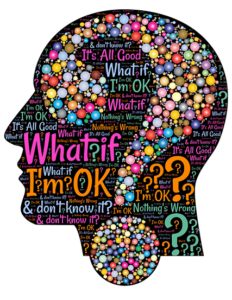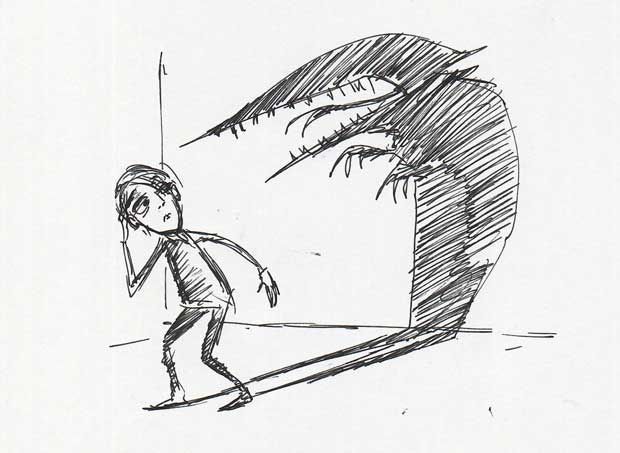If you are one of the many people who suffer from OCD intrusive thoughts, then you know how disruptive and frightening they can be. These thoughts can come at any time, and often seem to pop up for no reason. It can be difficult to know how to deal with them effectively. In this blog post, we will discuss some strategies that can help you manage your intrusive thoughts and keep them from taking over your life.
Contents
What Are OCD Intrusive Thoughts?
 OCD in its simplest form is defined as having intrusive thoughts that lead to compulsions (behaviors or actions one feels one must do to “fix” or prevent the thought from happening). However, it’s important to understand that not all people with OCD have compulsions and that intrusive thoughts alone can be just as distressing. These are called “pure-O” OCD.
OCD in its simplest form is defined as having intrusive thoughts that lead to compulsions (behaviors or actions one feels one must do to “fix” or prevent the thought from happening). However, it’s important to understand that not all people with OCD have compulsions and that intrusive thoughts alone can be just as distressing. These are called “pure-O” OCD.
Intrusive thoughts are defined as any thought that causes you marked anxiety or distress. These can be violent, graphic images (e.g., seeing yourself harming someone), fears of contamination (e.g., obsessing over germs), or repetitive, unwanted sexual images or urges (e.g., sexually assaulting someone). Many people with OCD will have multiple types of intrusive thoughts and they can range in intensity from mild to severe.
It’s important to understand that having an intrusive thought does not make you a bad person. Everyone has intrusive thoughts from time to time but people with OCD tend to fixate on them and believe that acting on them is inevitable which leads to compulsions.
Reasons For OCD Intrusive Thoughts

There are many reasons that people with OCD experience intrusive thoughts. Some of these reasons are:
Genetics
Genetics is one of the most important risk factors for developing OCD intrusive thoughts. If you have a family member with OCD, your risk of developing the disorder is increased. There may be many genes involved in OCD and intrusive thoughts.
Stressful life events
Stressful life events, such as the death of a loved one or a divorce, can trigger OCD intrusive thoughts. Sometimes these stressors can be so overwhelming that they lead to a diagnosis of PTSD.
Brain chemistry
Changes in brain chemistry can also lead to OCD intrusive thoughts. People with OCD may have problems with the way their brains process serotonin, which is a neurotransmitter that helps regulate mood. This can cause them to be more prone to anxiety and depression, which can trigger intrusive thoughts.
Abuse
Abuse is another risk factor for developing OCD intrusive thoughts. If you were abused as a child, you may be more likely to develop the disorder. Abuse can cause changes in the way your brain processes information, which can lead to intrusive thoughts.
Trauma
Another risk factor for developing OCD intrusive thoughts is trauma. If you’ve experienced a traumatic event, such as a car accident or a natural disaster, you may be more likely to develop the disorder. Trauma can cause changes in the way your brain processes information, which can lead to intrusive thoughts.
Other Mental Disorders
OCD is often comorbid with other disorders, such as anxiety disorders, mood disorders, and eating disorders. This means that people with OCD are more likely to have another mental illness along with their OCD. This can make treatment more difficult and can also increase the risk of developing intrusive thoughts.
Impacts of OCD Intrusive Thoughts

There are many impacts of having OCD intrusive thoughts. Some of these are:
Isolation
Isolation is one of the most common impacts of OCD intrusive thoughts. This is because people with OCD tend to avoid anything that might trigger their intrusive thoughts. For example, someone with a fear of contamination might avoid public places or someone with violent thoughts may avoid being around sharp objects. This can lead to social isolation and make it difficult to maintain relationships.
Anxiety
Intrusive thoughts are, by definition, anxiety-provoking. This can lead to a general feeling of anxiety that is constant and can be hard to manage. In some cases, the anxiety caused by intrusive thoughts can be so severe that it leads to panic attacks.
Depression
OCD intrusive thoughts can also lead to depression. This is because the constant cycle of having the thought, feeling anxiety, and engaging in compulsions can be very draining both emotionally and mentally. Additionally, isolation can worsen depression symptoms.
Trouble concentrating
Intrusive thoughts can make it difficult to concentrate on anything else. This is because the thoughts are often intrusive and hard to ignore. Additionally, anxiety can make it hard to focus on anything else. There may be also many things you are avoiding due to your OCD which can make it hard to focus on other things.
Impacts on School and Work
Anxiety, depression, and trouble concentrating can all impact school or work. This is because it can be hard to focus on anything else when you are dealing with OCD intrusive thoughts. Additionally, isolation can make it difficult to participate in class or work.
Relationship Issues
Another impact that can occur is relationship issues. This is because OCD can be very time-consuming and intrusive thoughts can make it hard to focus on anything else. Additionally, isolation can make it difficult to spend time with loved ones.
Suicidal Thoughts
Sometimes, the anxiety and isolation caused by OCD intrusive thoughts can lead to suicidal thoughts. This is because people may feel like they cannot escape their thoughts or that they are never going to get better. If you are having suicidal thoughts, it’s important to seek help from a mental health professional or hotline immediately.
Treatment of OCD Intrusive Thoughts

Treatments for OCD intrusive thoughts generally consist of exposure and response prevention (ERP) and medication.
Medications
Medications are one type of treatment that can be used for OCD intrusive thoughts. The most common type of medication is a selective serotonin reuptake inhibitor (SSRI). SSRIs work by increasing levels of serotonin in the brain which can help to decrease anxiety and improve mood.
Some of these medications are:
- Fluoxetine (Prozac)
- Sertraline (Zoloft)
- Paroxetine (Paxil)
- Fluvoxamine (Luvox)
- Citalopram (Celexa)
- Escitalopram (Lexapro)
These medications are also generally well-tolerated with few side effects. However, they can take several weeks to work so it’s important to be patient. Additionally, some people may experience temporary side effects when they first start taking them such as nausea, headache, or fatigue.
Exposure and Response Prevention (ERP)
The other type of treatment that is often used for OCD intrusive thoughts is exposure and response prevention (ERP). ERP is a type of cognitive behavioral therapy (CBT) that involves gradually exposing yourself to your fears and learning to resist engaging in compulsions.
For example, if you have a fear of contamination, your therapist might have you touch doorknobs or shake hands with someone. Once you are exposed to the fear, you would then practice resisting the urge to wash your hands or take a shower. ERP can be very effective for treating OCD intrusive thoughts. However, it can also be challenging. It’s important to work with a trained therapist who can help you through the process.
Cognitive behavioral therapy (CBT)
CBT is a therapy that helps by breaking down the thoughts, emotions, and behaviors that contribute to OCD. It can be done in individual sessions or in a group setting. A therapist will help you understand your thoughts and feelings, and then work with you to change them.
CBT is an effective treatment for OCD intrusive thoughts. In one study, CBT was found to be more effective than medication in treating people with OCD intrusive thoughts This type of therapy can be done in a short amount of time, and it can be done in an outpatient setting.
Dialectical behavioral therapy (DBT)
Dialectical behavioral therapy (DBT) is one of the most effective treatments for OCD. It teaches you how to deal with your intrusive thoughts in a more effective way.
DBT has four main components:
- Mindfulness: This involves learning to be more aware of your thoughts and feelings, and accepting them without judgment.
- Distress tolerance: This involves learning to deal with difficult situations in a more effective way.
- Emotion regulation: This involves learning how to control and manage your emotions more effectively.
- Interpersonal effectiveness: This involves learning how to communicate and interact with others more effectively.
Each component of DBT is designed to help you deal with your intrusive thoughts in a more effective way. If you are struggling with OCD, I highly recommend seeking out a qualified DBT therapist who can help you learn these skills.
Acceptance And Behavioral Therapy
Another way to effectively deal with intrusive thoughts is through acceptance and behavioral therapy. Acceptance and behavioral therapy helps individuals learn to accept their thoughts and not be afraid of them. This type of therapy also teaches people how to change their behavior in response to their thoughts.
For example, if someone has an intrusive thought about harming themselves, they may start to avoid all knives in the house. However, this can lead to more anxiety as it creates a fear of knives. Through acceptance and behavioral therapy, individuals can learn to accept that they have these thoughts, but they do not have to act on them. Additionally, they can learn how to change their behavior so that it is not controlled by their thoughts.
Support Groups
Support groups can be a great way to share your experiences with others who understand what you’re going through. It can be helpful to talk about your intrusive thoughts with people who have similar experiences. There are many online and in-person support groups available for people with OCD. These support groups are also a great way to find resources and information about OCD.
Some are online as well offline.
Self-Care Activities

There are many things you can do to take care of yourself if you have OCD. Some self-care activities that may be helpful include:
Relaxation techniques: Many relaxation techniques can help manage OCD. Examples of relaxation techniques include deep breathing, progressive muscle relaxation, and mindfulness meditation. These relaxation techniques are also generally safe to do on your own.
Exercise: Exercise can help reduce stress and improve your mood. It is also a great way to get rid of excess energy that may be causing you to feel anxious. Sometimes exercising also helps to take your mind off of your intrusive thoughts.
Eating a healthy diet: Eating a healthy diet can help improve your mood and energy levels. It is also important to eat regular meals if you are taking medication for OCD, as some medications can cause weight loss or gain.
Getting enough sleep: Getting enough sleep is important for overall health and well-being. It can also help manage OCD symptoms, as fatigue can worsen symptoms.
Avoiding alcohol and drugs: Alcohol and drugs can worsen OCD symptoms and make them more difficult to manage. If you feel like you need to drink or use drugs to cope with your OCD, it is important to talk to a doctor or therapist about this.
Trying new things: Trying new things can help you to challenge your OCD and push yourself outside of your comfort zone. It is important to start with small steps and gradually increase the difficulty of the task. For example, if you are afraid of germs, you may start by touching doorknobs and then progress to shaking hands with someone.
These are only a few examples of self-care activities that may help manage OCD intrusive thoughts. It is important to find what works best for you and to stick with it. Remember, recovery from OCD is possible and you are not alone.
How To Avoid OCD Intrusive Thoughts?

Avoiding OCD intrusive thoughts may seem impossible, but there are things you can do to lessen their frequency and intensity.
-Identify your triggers: What sets off your intrusive thoughts? For some people, it might be seeing a certain object or image. For others, it might be a specific situation or event. Once you know what triggers your intrusive thoughts, you can try to avoid those triggers.
-Challenge your thoughts: When you have an OCD intrusive thought, try to question it. Why am I thinking this? Is there any evidence that supports this thought? Am I overreacting? Challenging your thoughts can help lessen their power over you.
-Focus on something else: Distract yourself with another activity when you start to have an OCD intrusive thought. This can help take your mind off the thought and make it easier to let go of.
-Talk to someone: Talking to someone about your OCD intrusive thoughts can help you feel less alone and more in control. If you don’t feel comfortable talking to a friend or family member, there are also mental health professionals who can help.
Doing these things won’t make your OCD intrusive thoughts go away completely, but they can help lessen their frequency and intensity. Remember that you’re not alone in this – many people struggle with similar thoughts. You can get through this.
How To Help Someone With OCD Intrusive Thoughts?

Helping someone with OCD with intrusive thoughts can be difficult. The first step is to understand what they are going through. It is important to remember that the person with OCD is not their thoughts. The thoughts are just a symptom of the disorder.
There are many ways you can help someone with OCD intrusive thoughts. Some of these ways are:
Be Patient
Patience is important when dealing with someone with OCD intrusive thoughts. It can be frustrating to watch them struggle, but try to remember that they are doing the best they can. When there are many thoughts, it can be difficult to focus on anything else.
Offer Support
Offering support is one of the most important things you can do for someone with OCD intrusive thoughts. This includes emotional support as well as practical help. You might need to help them with day-to-day tasks or remind them of their treatment plan.
Educate Yourself About OCD
The more you know about OCD, the better equipped you will be to help someone with it. There are many resources available online and in libraries. You can also talk to a mental health professional to learn more.
Encourage Treatment
Treatment is essential for managing OCD intrusive thoughts. If you know someone with OCD who is not in treatment, encourage them to seek help. This can be a difficult conversation, but it is important. There are also many resources available to help someone find treatment.
Try To Avoid Taking On Too Much
It is important to take care of yourself as well. Dealing with someone with OCD intrusive thoughts can be difficult and draining. Try to set boundaries and take breaks when you need to. It is also important to have your support system in place.
Helping someone is not easy, but it is important. If you know someone with OCD intrusive thoughts, offer them your support. Remember that they are not their thoughts and that they are doing the best they can.
Conclusion
OCD Intrusive Thoughts can be extremely distressing and difficult to manage, but there are some effective ways to deal with them. If you’re struggling with OCD Intrusive Thoughts, remember that you’re not alone and there is help available. Seek professional help from a therapist or counselor who specializes in OCD, and try some of the self-help techniques outlined in this article. With patience, effort, and support, you can overcome your OCD Intrusive Thoughts and live a full and happy life.
There are many helpful resources available if you or someone you know is struggling with OCD Intrusive Thoughts. These also provide great support for friends and family members. Your mental health — Your psychological, emotional, and social well-being — has an impact on every aspect of your life.
Hope this article was of help to you! If you are suffering from OCD, you may seek help from Therapy Mantra. We have a team of highly trained and experienced therapists who can provide you with the tools and skills necessary for overcoming OCD. Contact us today to schedule an online therapy or download our free OCD treatment app on Android or iOS for more information.


